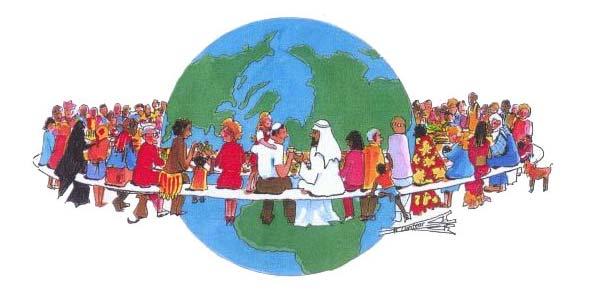"The Struggle for Tomorrow Begins in the Global South"-
In a world racing toward uncertain futures—shaped by climate disruption, digital empires, and shifting global power—the real battle for tomorrow is not being fought in the corridors of Brussels, Washington, or Beijing.
It is unfolding in the streets of Lagos, the classrooms of Dhaka, the tech hubs of Nairobi, and the fields of Medellín.
The Global South is not just catching up—it is becoming the ground zero of the 21st-century struggle for justice, sustainability, and dignity.
The Global South: From Periphery to Pivot
Once dismissed as “developing,” “third world,” or “underdeveloped,” the nations of the Global South are now home to:
85% of the world’s population
The youngest generation in human history
Massive reserves of critical minerals, natural resources, and agricultural power
Fast-growing digital innovation sectors and green energy initiatives
Yet they are also home to the most vulnerable victims of climate change, economic inequality, and global power asymmetries.
Why the Struggle Starts Here
1. Climate Survival-
Rising seas, failing rains, desertification—climate breakdown hits the South first and hardest.
Yet these regions contributed least to the crisis.
2. Economic Sovereignty-
The trap of raw exports, debt dependency, and unfair trade keeps many nations in neo-colonial chains.
The battle is not just for wealth—but for ownership, agency, and value creation.
3. Digital Control-
Data is the new oil—but who owns the pipelines?
The South’s youth are building apps, startups, and AI solutions—but face domination from Silicon Valley and Chinese megaplatforms.
4. Cultural Liberation-
Identity, education, and history are being rewritten.
Movements from Soweto to Santiago are saying: We will define who we are, not your textbooks or your algorithms.
What the Global South Brings to the World-
Afrocentric and Asiacentric philosophies like Ubuntu, harmony, and interdependence challenge the West’s hyper-individualism.
Youth-driven creativity in music, tech, fashion, and social activism is reshaping global trends.
Alternative models of progress—communal, ecological, and spiritually rooted—are emerging as powerful antidotes to broken Western paradigms.
The Real Questions of Tomorrow-
Will Africa, Asia, and Latin America forge non-aligned, sovereign paths—or become battlegrounds for China-West rivalry?
Can they build coalitions of solidarity, trade, and knowledge exchange on their own terms?
Will they escape the resource curse or repeat the same extractive patterns under new flags?
Conclusion: The South Must Lead, Not Follow-
The future of the planet—economically, ecologically, culturally—will be decided in the Global South. But it won’t come through charity, lectures, or trickle-down promises. It must come through ownership, resistance, and bold new visions.
This is not just the South’s struggle.
It is humanity’s.
And it begins now.
In a world racing toward uncertain futures—shaped by climate disruption, digital empires, and shifting global power—the real battle for tomorrow is not being fought in the corridors of Brussels, Washington, or Beijing.
It is unfolding in the streets of Lagos, the classrooms of Dhaka, the tech hubs of Nairobi, and the fields of Medellín.
The Global South is not just catching up—it is becoming the ground zero of the 21st-century struggle for justice, sustainability, and dignity.
The Global South: From Periphery to Pivot
Once dismissed as “developing,” “third world,” or “underdeveloped,” the nations of the Global South are now home to:
85% of the world’s population
The youngest generation in human history
Massive reserves of critical minerals, natural resources, and agricultural power
Fast-growing digital innovation sectors and green energy initiatives
Yet they are also home to the most vulnerable victims of climate change, economic inequality, and global power asymmetries.
Why the Struggle Starts Here
1. Climate Survival-
Rising seas, failing rains, desertification—climate breakdown hits the South first and hardest.
Yet these regions contributed least to the crisis.
2. Economic Sovereignty-
The trap of raw exports, debt dependency, and unfair trade keeps many nations in neo-colonial chains.
The battle is not just for wealth—but for ownership, agency, and value creation.
3. Digital Control-
Data is the new oil—but who owns the pipelines?
The South’s youth are building apps, startups, and AI solutions—but face domination from Silicon Valley and Chinese megaplatforms.
4. Cultural Liberation-
Identity, education, and history are being rewritten.
Movements from Soweto to Santiago are saying: We will define who we are, not your textbooks or your algorithms.
What the Global South Brings to the World-
Afrocentric and Asiacentric philosophies like Ubuntu, harmony, and interdependence challenge the West’s hyper-individualism.
Youth-driven creativity in music, tech, fashion, and social activism is reshaping global trends.
Alternative models of progress—communal, ecological, and spiritually rooted—are emerging as powerful antidotes to broken Western paradigms.
The Real Questions of Tomorrow-
Will Africa, Asia, and Latin America forge non-aligned, sovereign paths—or become battlegrounds for China-West rivalry?
Can they build coalitions of solidarity, trade, and knowledge exchange on their own terms?
Will they escape the resource curse or repeat the same extractive patterns under new flags?
Conclusion: The South Must Lead, Not Follow-
The future of the planet—economically, ecologically, culturally—will be decided in the Global South. But it won’t come through charity, lectures, or trickle-down promises. It must come through ownership, resistance, and bold new visions.
This is not just the South’s struggle.
It is humanity’s.
And it begins now.
"The Struggle for Tomorrow Begins in the Global South"-
In a world racing toward uncertain futures—shaped by climate disruption, digital empires, and shifting global power—the real battle for tomorrow is not being fought in the corridors of Brussels, Washington, or Beijing.
It is unfolding in the streets of Lagos, the classrooms of Dhaka, the tech hubs of Nairobi, and the fields of Medellín.
The Global South is not just catching up—it is becoming the ground zero of the 21st-century struggle for justice, sustainability, and dignity.
The Global South: From Periphery to Pivot
Once dismissed as “developing,” “third world,” or “underdeveloped,” the nations of the Global South are now home to:
85% of the world’s population
The youngest generation in human history
Massive reserves of critical minerals, natural resources, and agricultural power
Fast-growing digital innovation sectors and green energy initiatives
Yet they are also home to the most vulnerable victims of climate change, economic inequality, and global power asymmetries.
Why the Struggle Starts Here
1. Climate Survival-
Rising seas, failing rains, desertification—climate breakdown hits the South first and hardest.
Yet these regions contributed least to the crisis.
2. Economic Sovereignty-
The trap of raw exports, debt dependency, and unfair trade keeps many nations in neo-colonial chains.
The battle is not just for wealth—but for ownership, agency, and value creation.
3. Digital Control-
Data is the new oil—but who owns the pipelines?
The South’s youth are building apps, startups, and AI solutions—but face domination from Silicon Valley and Chinese megaplatforms.
4. Cultural Liberation-
Identity, education, and history are being rewritten.
Movements from Soweto to Santiago are saying: We will define who we are, not your textbooks or your algorithms.
What the Global South Brings to the World-
Afrocentric and Asiacentric philosophies like Ubuntu, harmony, and interdependence challenge the West’s hyper-individualism.
Youth-driven creativity in music, tech, fashion, and social activism is reshaping global trends.
Alternative models of progress—communal, ecological, and spiritually rooted—are emerging as powerful antidotes to broken Western paradigms.
The Real Questions of Tomorrow-
Will Africa, Asia, and Latin America forge non-aligned, sovereign paths—or become battlegrounds for China-West rivalry?
Can they build coalitions of solidarity, trade, and knowledge exchange on their own terms?
Will they escape the resource curse or repeat the same extractive patterns under new flags?
Conclusion: The South Must Lead, Not Follow-
The future of the planet—economically, ecologically, culturally—will be decided in the Global South. But it won’t come through charity, lectures, or trickle-down promises. It must come through ownership, resistance, and bold new visions.
This is not just the South’s struggle.
It is humanity’s.
And it begins now.
0 Commenti
0 condivisioni
2K Views
0 Anteprima




